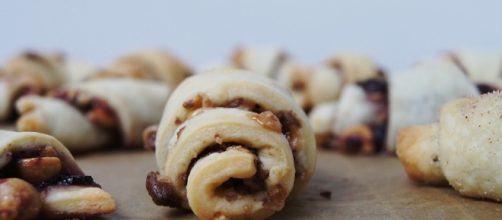Jewish cuisine has evolved over many centuries. Much of Jewish cuisine has been influenced by agriculture, tradition, and economic ebbs and flows. The many countries where Jewish communities have settled throughout the world play an important role in the foods they eat today.
Years ago, Rugelach originated in Eastern European Jewish communities. This is a treat that women prepared and ate like we eat cookies today. There are many variations in terms of how to make it, and just as many variations in terms of how to shape them.
Typically, Rugelach is formed in a crescent shape and is about the size of a small cookie.
Jewish cookie enjoyed by Americans
The delicious Jewish cookie we know and enjoy today in America comes from an Eastern European pastry known as Kipfel, similar to a croissant-like cookie. Ingredients include flour, yeast, butter, sugar, and sour cream. Kipfel is sometimes filled with fruit and/or nuts, but there are other recipes that are not. Rugelach is enjoyed by Jews and non-Jews the world over.
It is a scrumptious treat that can be made either with sour cream or cream cheese dough. There are also non-dairy recipes that can be eaten as a dessert or as part of a kosher meal. It is believed that the cream cheese dough is more than likely an influence of American culture. However, sour cream dough that includes yeast is said to be a much older recipe.
Assortment of taste and texture
While fillings have a great assortment of taste and texture, the dough most American bakers use is a standard one. The usual recipe calls for equal amounts of flour, butter, and cream cheese.
Some bakers add a bit of sour cream, sugar, and salt just to change things up a bit. In keeping with the original recipe, many people use sour cream in their dough -- similar to the way Kipfel is made. I like to add both because I love the way the dough bakes -- crispy on the outside, soft, flaky, and delicious on the inside.
Variety of fillings
The most common fillings include marzipan, poppy seeds, chocolate, walnuts, raisins, cinnamon, fruit preserves and more.
The Eastern European Jewish pastry Schnecken from areas of Poland, Russia, and the Ukraine closely resemble Rugelach.
The major difference between the two is that Schnecken is most commonly made with a cream cheese dough and rolled into a cylinder. It is then sliced into a spiral. Rugelach, on the other hand, is formed into individual shapes depending on individual preferences.
In recent years, chefs have introduced chicken, schmaltz, salmon, and Boursin cheese. Yum!


